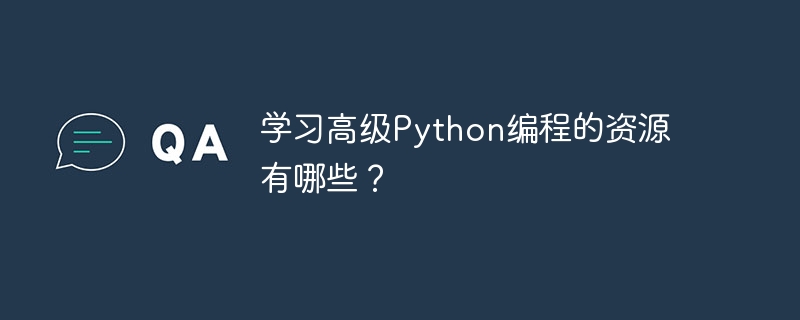

The demand for Python as a programming language drives its rich resources for learning its different aspects. While beginners have a variety of tutorials and guides to help them get started, advanced learners often struggle to find resources that meet their specific needs. In this article, we'll explore a series of resources designed to improve your Python skills, covering topics such as advanced language features, design patterns, performance optimization, and more.
To get the most out of Python, it’s important to master its advanced language features. These features enable efficient, readable, and maintainable code.
"Fluent Python" is a book highly recommended for experienced Python developers who want to gain a deeper understanding of the language. The book covers advanced topics such as metaclasses, descriptors, generators, and coroutines with clear explanations and practical examples.
This open book provides in-depth insight into Python’s advanced features and best practices. It covers topics such as program design, maintainers, context managers, and a host of design patterns and jargon.
"Effective Python" is a collection of 90 specific, actionable guidelines to help you write better Python code. The book covers various advanced topics, including concurrency, metaclasses, and modules, and provides practical tips for improving code readability and efficiency.
Design patterns are reusable solutions to common problems that arise in software design. Learning these patterns helps you write more efficient and maintainable code.
The original "Design Patterns: Elements of Reusable Object-Oriented Software" by the Gang of Four (GoF) is a classic in software design literature. Although the examples are in C , the concepts are applicable to Python and can be adapted with a little effort.
This book offers a comprehensive guide to design patterns specifically tailored for Python developers. It covers 23 classic GoF patterns, along with 16 additional patterns relevant to Python. Each pattern is explained using real-life examples and includes a hands-on exercise .
Alex Martelli's PyCon presentations on design patterns in Python are a valuable resource for those who prefer video-based learning. Martelli, a respected Python expert, discusses various patterns and demonstrates their implementation in Python.
As your Python projects grow in size and complexity, performance optimization becomes critical. The following resources will help you write faster, more efficient code.
This book focuses on using various analysis, benchmarking, and optimization methods to improve the execution efficiency of your Python code. It covers topics such as concurrency, parallelism, and memory management.
Jake Vanderplas's PyCon presentation, "Losing Your Loops: Fast Numerical Computing with NumPy," provides an excellent introduction to optimizing numerical computations in Python. He demonstrates how to leverage NumPy and other libraries to achieve significant performance gains.
Raymond Hettinger, a Python core developer, shared valuable performance optimization tips in his talk titled "Transforming Code into Elegant, Idiomatic Python". He focuses on optimizing code for readability, maintainability, and speed, and emphasizes the importance of Python's built-in features and idioms.
Expanding your knowledge of advanced Python libraries and frameworks is essential for tackling complex projects and solving domain-specific problems.
These libraries form the foundation of the Python data science and numerical computing ecosystem. NumPy provides powerful tools for working with multidimensional arrays, while SciPy extends NumPy's scientific computing capabilities. Pandas is a powerful data processing and analysis library. To learn about these libraries, you can refer to Jake Vanderplas's "Python Data Science Handbook" and the official documentation of each library.
TensorFlow and PyTorch are popular libraries for machine learning and deep learning. Both libraries have extensive documentation, tutorials, and community support to help you dive into advanced machine learning topics. Additionally, consider resources like "Deep Learning with Python" by François Chollet and "Deep Learning for Coders with Fastai and PyTorch" by Jeremy Howard and Sylvain Gugger.
Django and Flask are popular web frameworks for building web applications in Python. To learn advanced web development using this framework, consider resources like "Django for Professionals" by William S. Vincent, "Flask Web Development" by Miguel Grinberg, and official documentation on the frameworks of any of these.
Mastering advanced Python programming requires exploring all aspects of the language, design patterns, performance optimizations, and specialized libraries and frameworks. By leveraging these resources and actively participating in real-world projects, you can improve your Python skills and solve complex problems with confidence. As you continue your Python journey, remember that learning is an ongoing process - stay curious and never stop exploring new concepts and techniques.
The above is the detailed content of What are some resources for learning advanced Python programming?. For more information, please follow other related articles on the PHP Chinese website!




